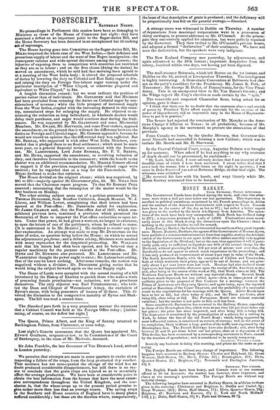POSTSCRIPT.
SATURDAY NIGHT.
No proceedings in Parliament this session have been so damaging to Ministers as those of the House of Commons last night : they have sustained a defeat on an important point in the Sugar-duties Bill, and the Home Secretary has been detected in an unexplained but ill-looking act of espionage.
The House having gone into Committee on the Sugar-duties Bill, Mr. MILEs reopened the whole case of the West Indies,—their deficient and precarious supply of labour and the want of free Negro immigration ; the consequent ruinous and wide-spread distresses among the planters ; the injustice of exposing them to competition with countries not restricted as they are as to labour ; and on the first clause (fixing the duties) he roved an amendment, which he said bad that morning been agreed to at a meeting of the West India body : it altered the proposed schedule of duties by lowering the duty on Colonial and East India sugar to 20a., and raising the duty on Foreign free-labour sugar coming under the particular description of "White Cloyed, or otherwise prepared and equivalent to White Cloyed," to 34.e.
A longish discussion ensued ; but we must indicate the position of parties rather than of individuals. Mr. Gornanots said that Ministers had been precluded from reducing the duties on Colonial sugar by con- siderations of revenue ; while the little prospect of increased supply from the West Indies, coupled with the increasing demand in this coun- try, necessitated steps for enlarging the supply. He objected to an- nouncing the reduction so long beforehand, as wholesale dealers would delay their purchases, and sugar would continue dear during the fruit- season. He was supported by Mr. GLADSTONE and some Ministerial Members. Mr. EWART, Mr. BOUvERIE, and some Free-traders, opposed the amendment, on the ground that it widened the difference between the duties on Foreign and Colonial sugar. Mr. GODSON opposed it, because he would not record an opinion that the differential duty was sufficient. But Mr. BERNAL, who supported it with other West India Members, con- tended that it pledged them to no final settlement ; which mast be made next year, on a general financial review connected with the Income- tax. MT. LABOUCUERE, Lord JOHN RUSSELL, Mr. F. T. BARING, and Mr. HOME, supported the amendment, as involving reduction of duty, and therefore favourable to the consumer ; while the benefit to the planter was an additional recommendation. Mr. MH.NER GIBSON offered to support it if the provision respecting partially-refined sugar were omitted; but he regarded that as a trap for the Free-traders. Mr. MILEs declined to make that omission.
The House divided on the original clause; which was negatived, by 241 to 221—majority against the Government plan, 20. Mr. MILES then moved that the Chairman report progress. To that Sir ROBERT PEEL assented ; announcing that the resumption of the matter would be the first business on Monday.
The other stirring subject arose out of a petition presented by Mr. THOMAS DurecoansE, from Serafino Calderara, Joseph Mazzini, W. J. Linton, and William Lovett, complaining that their letters had been opened at the Post-office : Mr. Duncombe called for explanation. Sir JAMES Gasman said, that the Post-office Act of 1837, which con- solidated previous laws, continued a provision which permitted the Secretaries of State to empower the Post-office authorities to open let- ters. Tinder that power, he had given a warrant, no longer in existence, to open the letters of one of the petitioners, whom he refused to name. [It is understood to be Mr. Mazzini.] He declined to render any fur- ther explanation. An attempt was made to stop Mr. DUNCOMBE on the point of order, no question being before the House: on which he moved the adjournment proforma ; and a debate arising, Ministers were assailed with many reproaches for the despotical proceeding. Mr. WALLACE said that his letters had often been opened, and he believed that a regular machinery for the purpose existed at the Post-office. Mr. Bumn and Dr. BOWRING also protested. Mr. LABOUCHERE and Mr. WARBURTON thought the power ought to exist ; Mr. Labonchere adding, that of the case he knew nothing. After some remarks, the motion was negatived without a division ; Mr. DUNCOMBE giving notice that he would bring the subject forward again on the next Supply night.
The House of Lords were occupied with the second reading of a hill introduced by the Bishop of EXETER to punish those who make a trade of procuring female prostitution—not seduction, nor the prostitutes themselves. The only objector was Earl FITZHARDINGE ; who twit- ted the Dean and Chapter of Westminster Abbey, the excluders of Byron's statue, with being possessors of houses of ill-fame. This di- verted the discussion to the comparative morality of Byron and Shak- spere. The bill was read a second time.


























 Previous page
Previous page